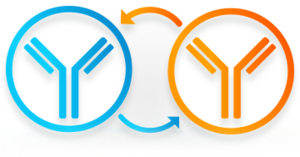A recently published review [1] questions the need for systematic switch studies to demonstrate the interchangeability of biosimilars, suggesting the studies are becoming obsolete.
Systematic switch studies are used to demonstrate the interchangeability of a biosimilar with their originator product. These studies are required by many regulatory bodies. However, according to a newly published review [1], theoretical considerations and clinical data question both the feasibility and relevance of such studies.
The author begins by offering definitions of interchangeability, which differ in the US and the EU. In the US, interchangeability is regarded as a higher level of biosimilarity that allows automatic substitution. The US Food and Drug Administration (FDA) may grant interchangeable status to licensed biosimilars if they fulfil the requirements of its interchangeability guideline, which includes a controlled clinical trial consisting of three switches – a process which is a burden to developers and patients.
In the EU, interchangeability is a scientific and clinical concept meaning that switching between a biosimilar and its reference product does not change the efficacy or safety. Interchangeable products can be switched under the control of the prescriber (physician-led switch) or at the pharmacy without consultation of the prescriber (automatic substitution).
In the EU, switching studies are not required. However, the concept of a clinical switch study remains prominent among prescribers and policymakers, as demonstrated in position papers and hesitance among prescribers. Manufacturers of originator products also support switching studies, which discourages biosimilar development, the author says.
One reason put forward for switching studies is switch-related immunogenicity, which describes an increased immune response due to subtle differences in the structure of biological and biosimilar products.
However, the author suggests that this is highly unlikely to occur after switching between a biosimilar and reference product that have already been shown to be highly similar and which are expected to have some degree of immunological tolerance due to their resemblance to human proteins.
Although switch-related immunogenicity is possible, for example, due to impurities such as bacterial endotoxins or degraded and aggregated proteins caused by inappropriate storage or poor formulations, this is unlikely in licensed biological products due to rigorous formulation assessments and stability studies. Switch-related immunogenicity is therefore a ‘remote risk’, the author says.
Finally, the author cites clinical evidence, including a review of 178 clinical switch studies of biosimilars and their reference products which found no evidence of switch-related adverse effects. More recent reviews of newer biosimilars also confirm a lack of switch-related adverse effects. Therefore, the hypothesis of switch-related adverse effects is not supported by current evidence and risk management of switching should be based on pharmacovigilance and pharmacoepidemiological studies rather than clinical switch studies.
The author concludes that the concept of systematic switch studies is becoming obsolete, and recommends that EU regulators issue a common position on the interchangeably of biosimilars, stating that EU-licensed biosimilars are interchangeable with the reference product without systematic clinical switch studies.
Conflict of interest
The author of the research paper [1] declared that there was no conflict of interest and stated that no financial support was received for conducting the research.
Editor’s comment
Readers interested to learn more about biosimilars and switching are invited to visit www.gabi-journal.net to view the following manuscripts published in GaBI Journal:
Biosimilars in Saudi Arabia: a single-centre, open-label case series examining infliximab switching
Switching from the infliximab reference product to CT-P13 in patients with rheumatoid arthritis or ankylosing spondylitis: results of the PLANETAS and PLANETRA extension studies
A critical review of substitution policy for biosimilars in Canada
GaBI Journal is indexed in Embase, Scopus, Emerging Sources Citation Index and more.
Readers interested in contributing a research or perspective paper to GaBI Journal – an independent, peer reviewed academic journal – please send us your submission here.
GaBI Journal Citation Impact
1.9 – CiteScore 2020 (calculated on 5 May 2021)
2.2 – CiteScoreTracker 2021 (Last updated on 6 March 2022)
Submit a manuscript to GaBI Journal
Related articles
Nova Scotia, Canada implements biosimilar switching policy
Biosimilars and non-medical switching among Saudi rheumatologists: The knowledge gap
Multiple successive switches between infliximab biosimilars in IBD
| LATIN AMERICAN FORUM The new section of the ‘Latin American Forum’ on GaBI has been launched. The objective of this new section is to provide you with all the latest news and updates on developments of generic and biosimilar medicines in Latin America in Spanish. View last week’s headline article: Nomenclatura de biológicos y biocomparables en México Browse the news in the Latin American Forum! Register to receive the GaBI Latin American Forum newsletter. Inform colleagues and friends of this new initiative. LATIN AMERICAN FORUM Se ha lanzado la nueva sección del ‘Foro Latinoamericano’ sobre GaBI. El objetivo de esta nueva sección es brindarle las últimas noticias y actualizaciones sobre desarrollos de medicamentos genéricos y biosimilares en América Latina en español. Vea el artículo principal de la semana pasada: Nomenclatura de biológicos y biocomparables en México !Explore las noticias en el Foro Latinoamericano! Regístrese para recibir el boletín informativo GaBI Foro Latinoamericano. Informe a colegas y amigos sobre esta nueva iniciativa.
|
Reference
1. Kurki, P. No need for systematic switch studies to demonstrate interchangeability of biosimilars. Generics and Biosimilars Initiative Journal (GaBI Journal). 2022;11(1). doi: 10.5639/gabij.2022.1101.002
Permission granted to reproduce for personal and non-commercial use only. All other reproduction, copy or reprinting of all or part of any ‘Content’ found on this website is strictly prohibited without the prior consent of the publisher. Contact the publisher to obtain permission before redistributing.
Copyright – Unless otherwise stated all contents of this website are © 2022 Pro Pharma Communications International. All Rights Reserved.








 0
0











Post your comment